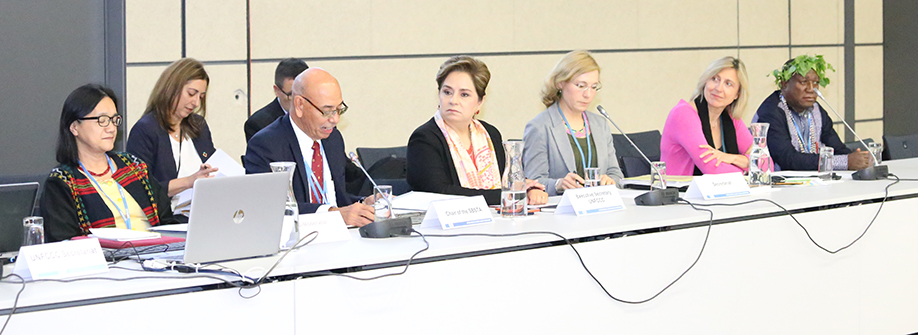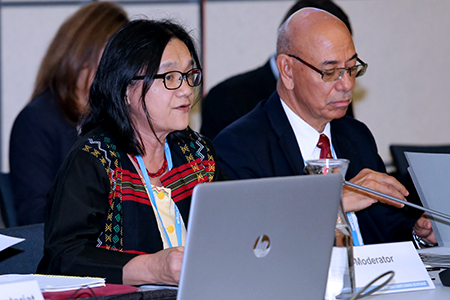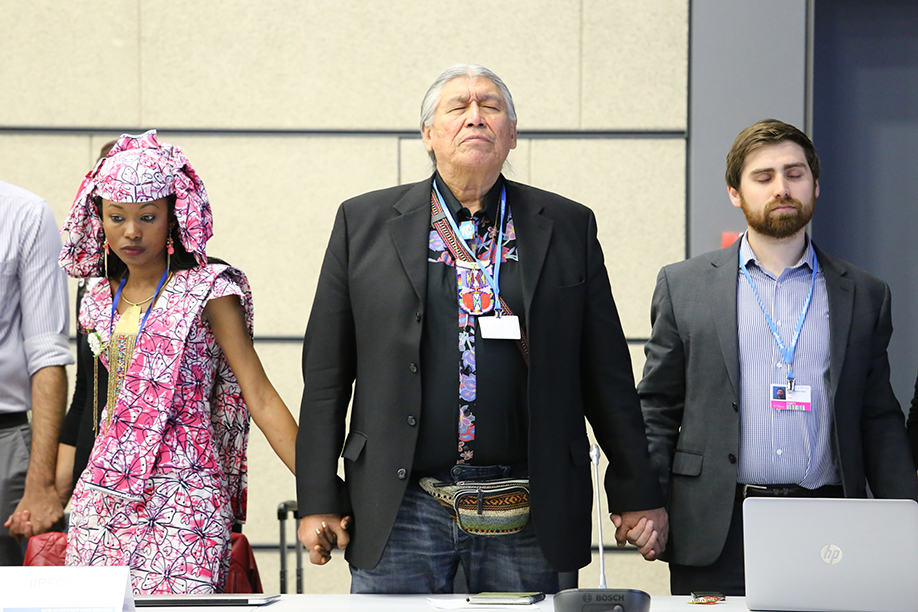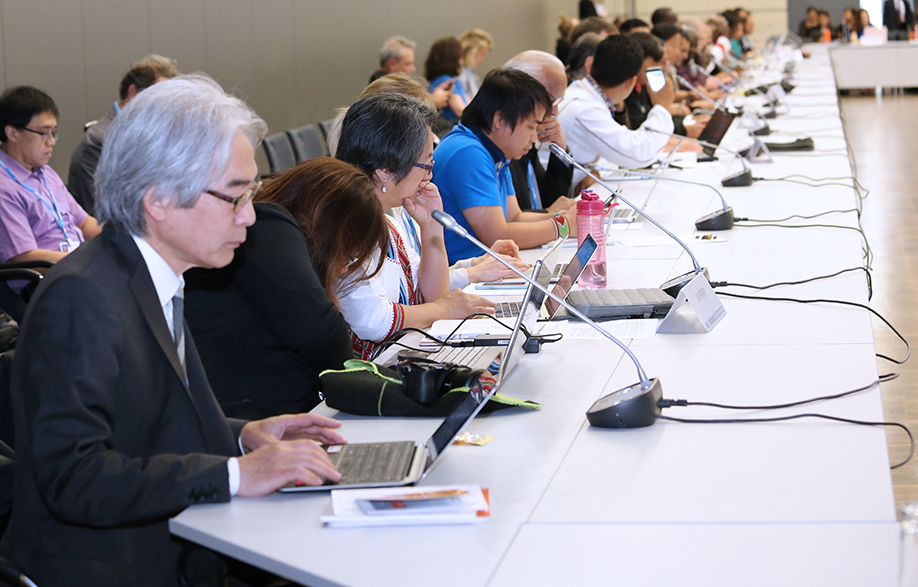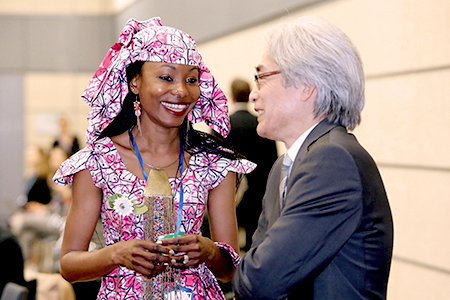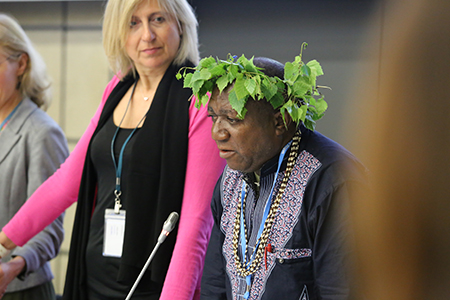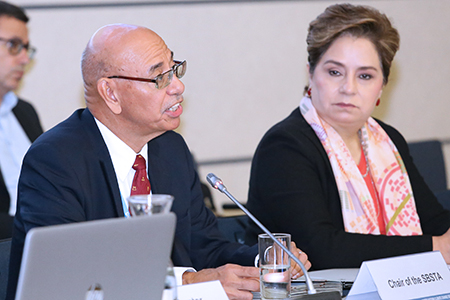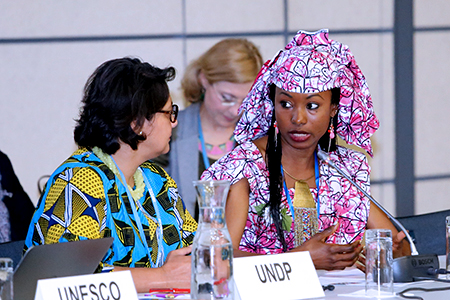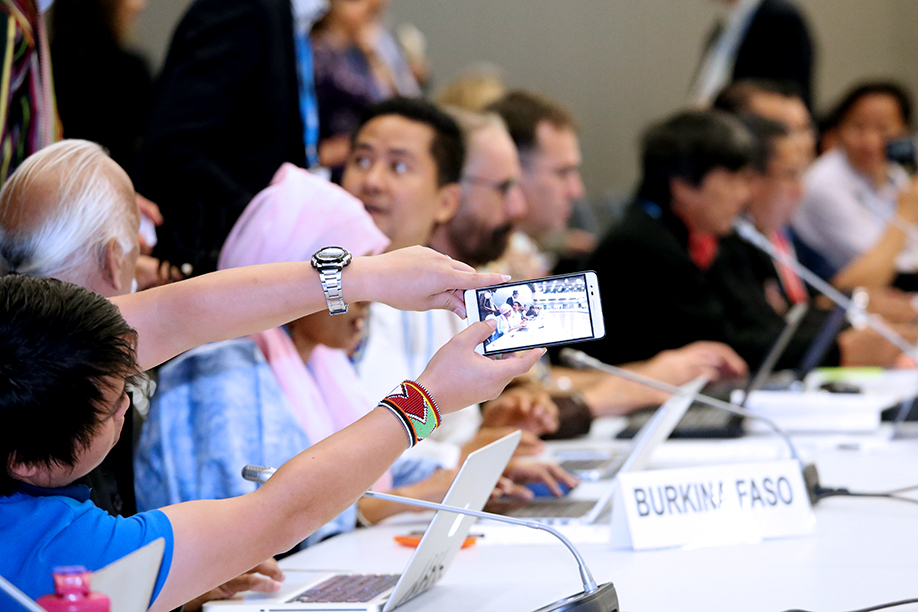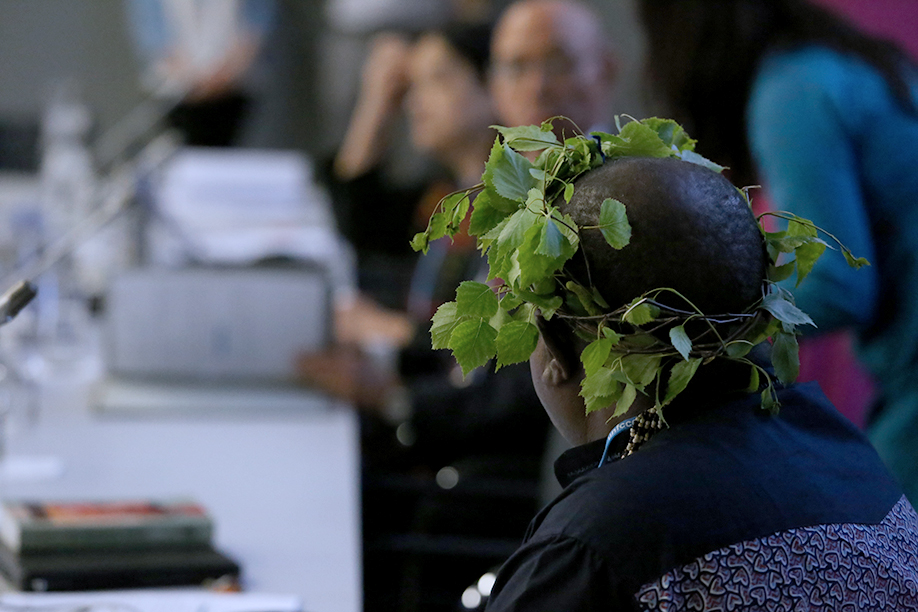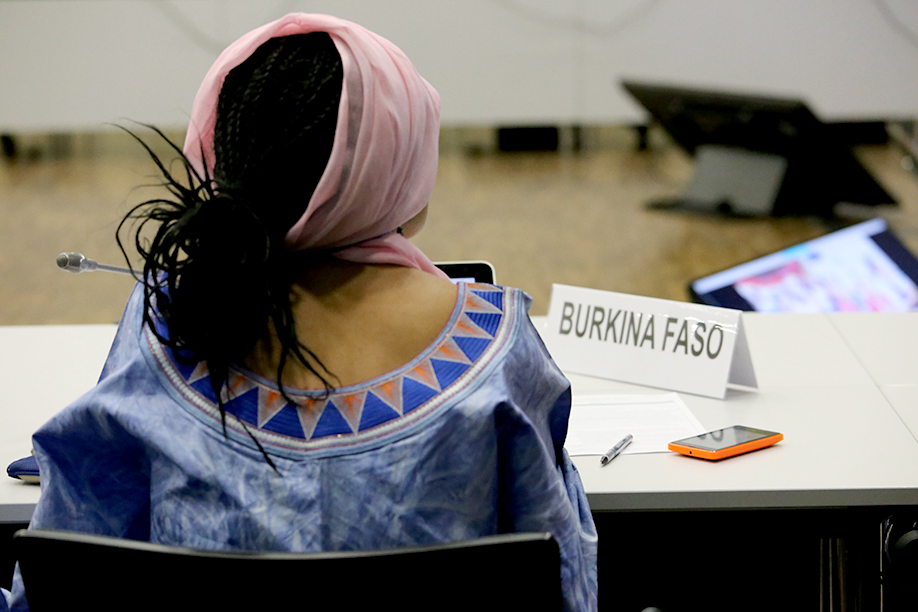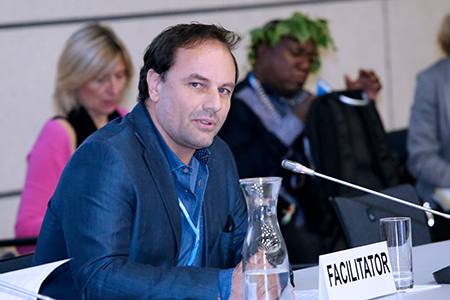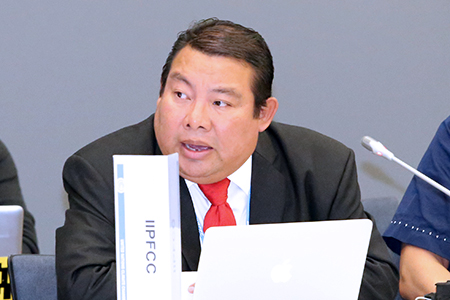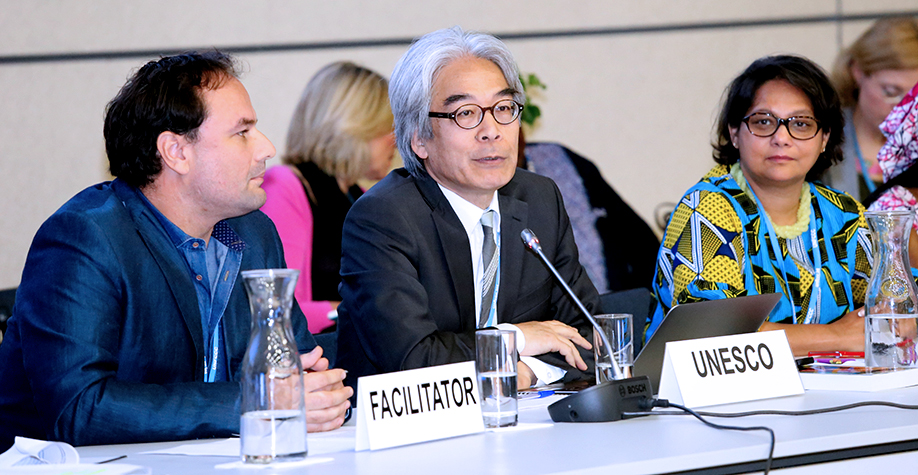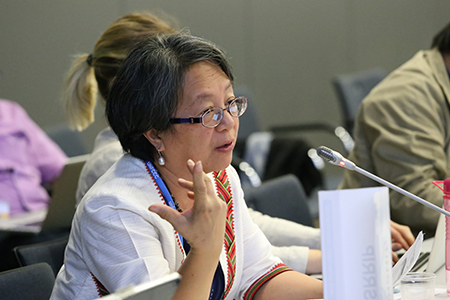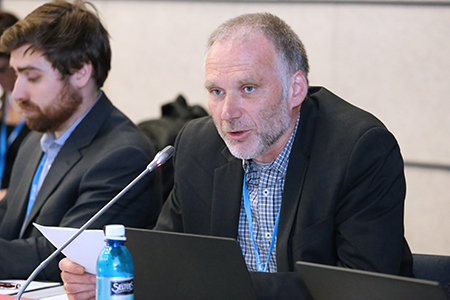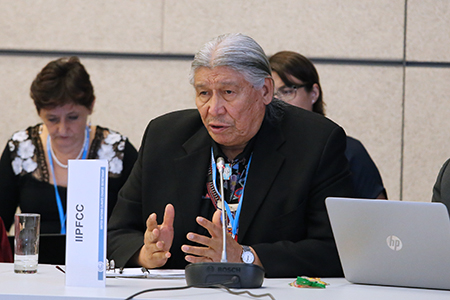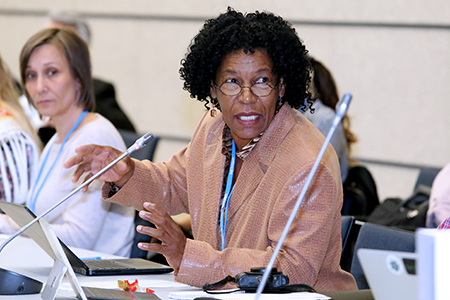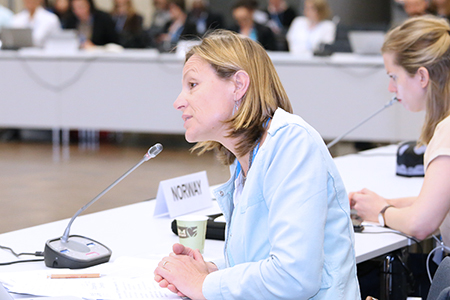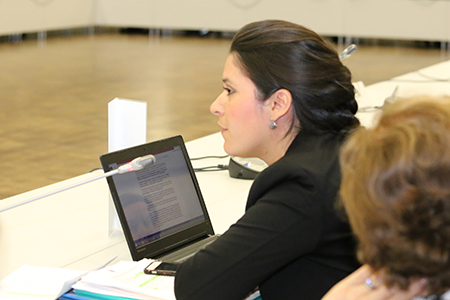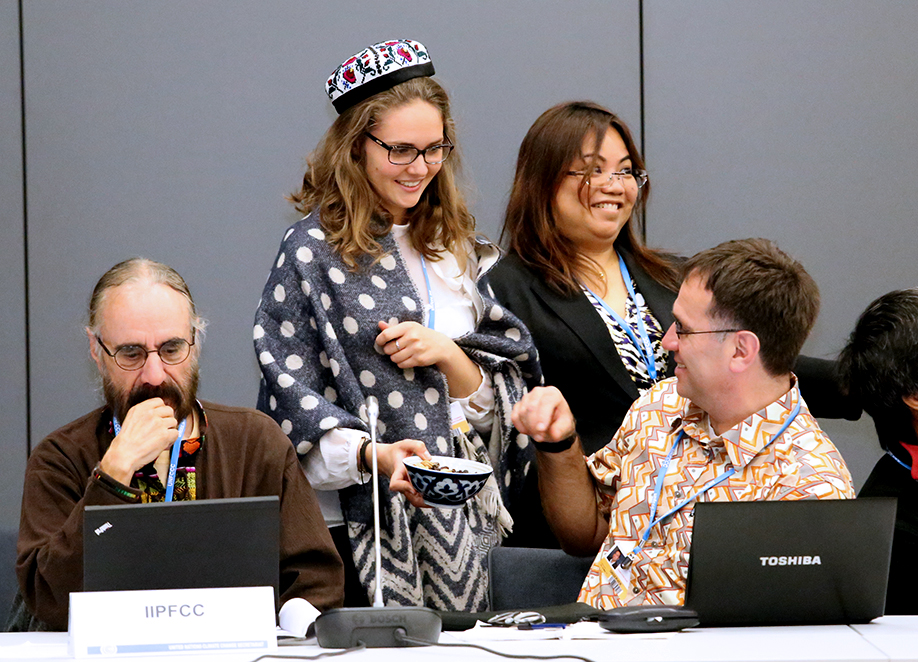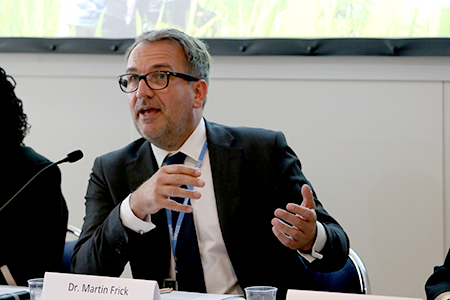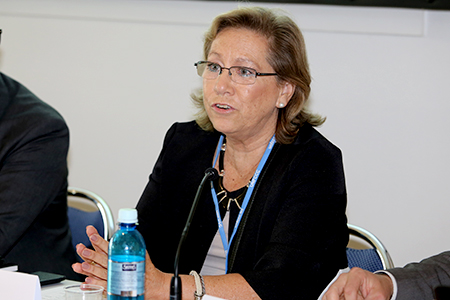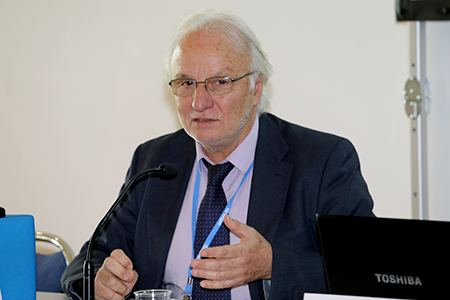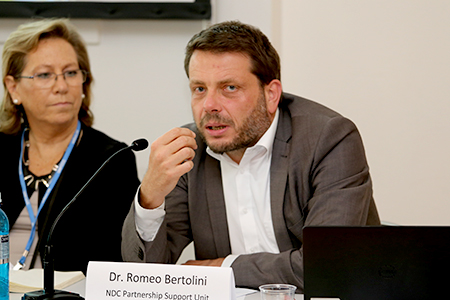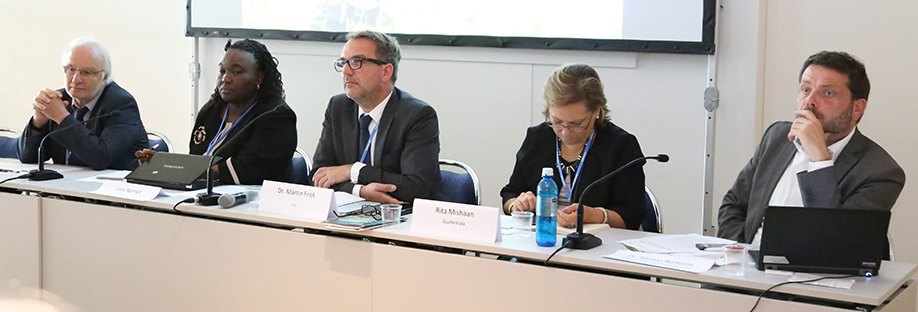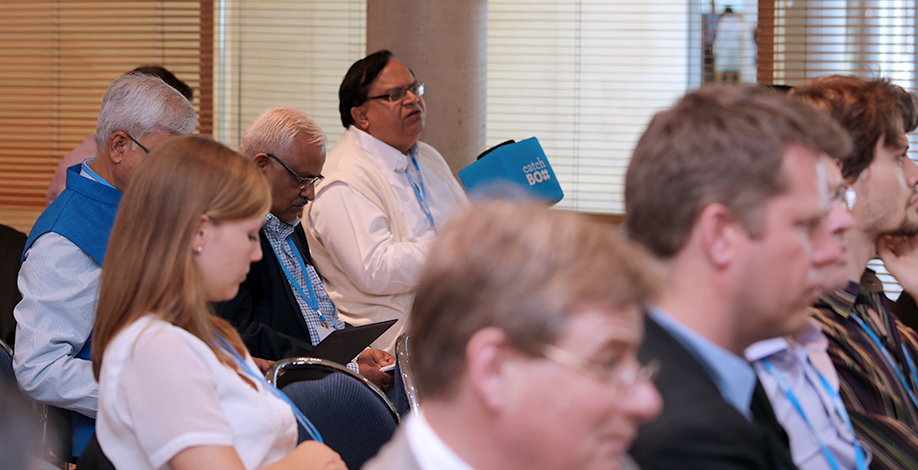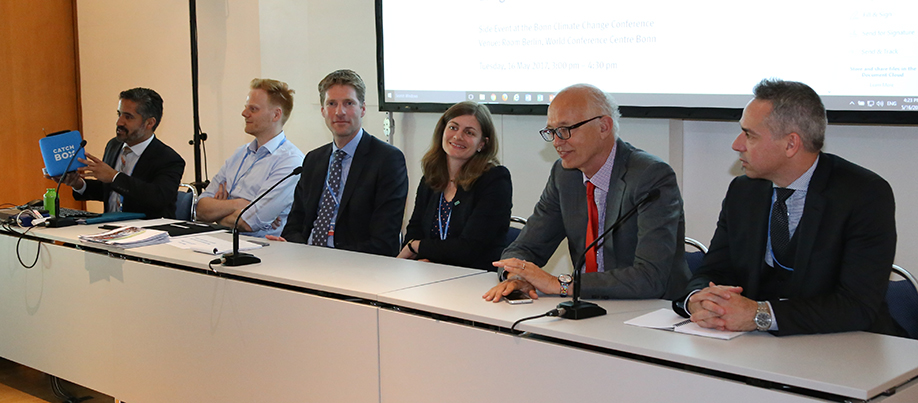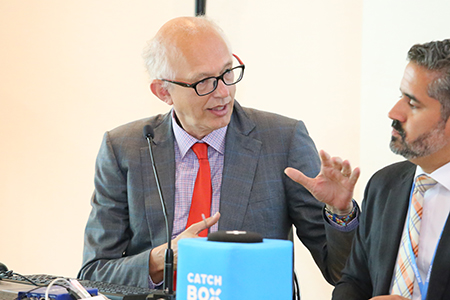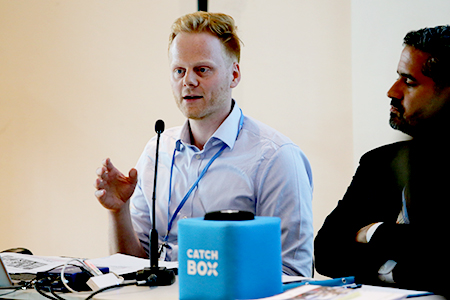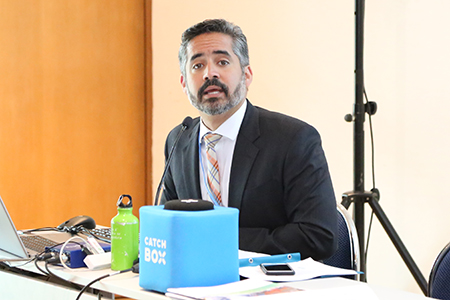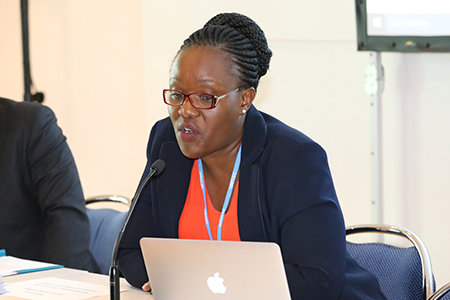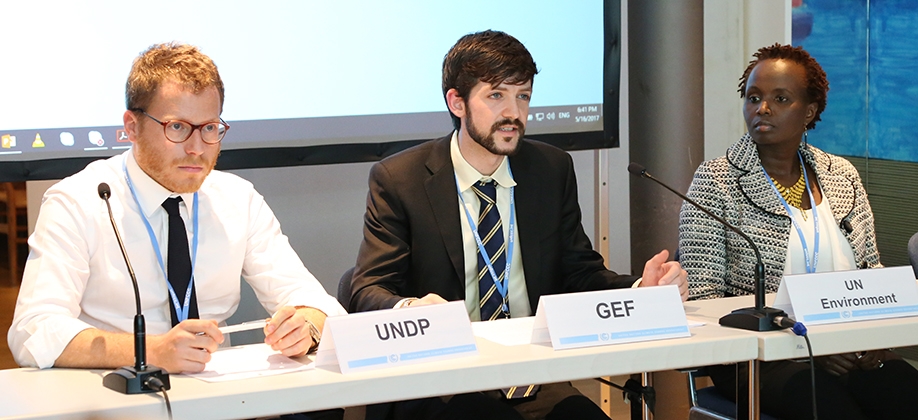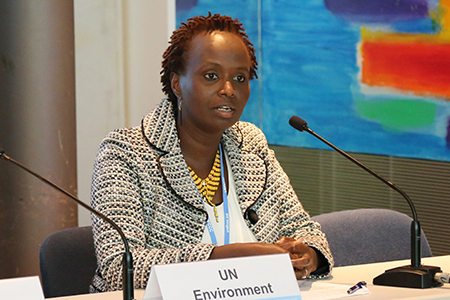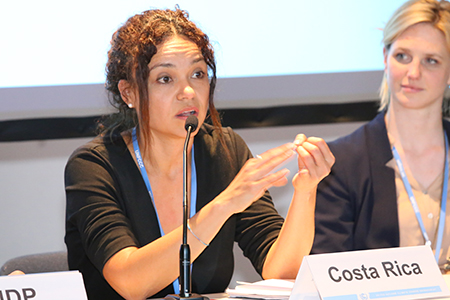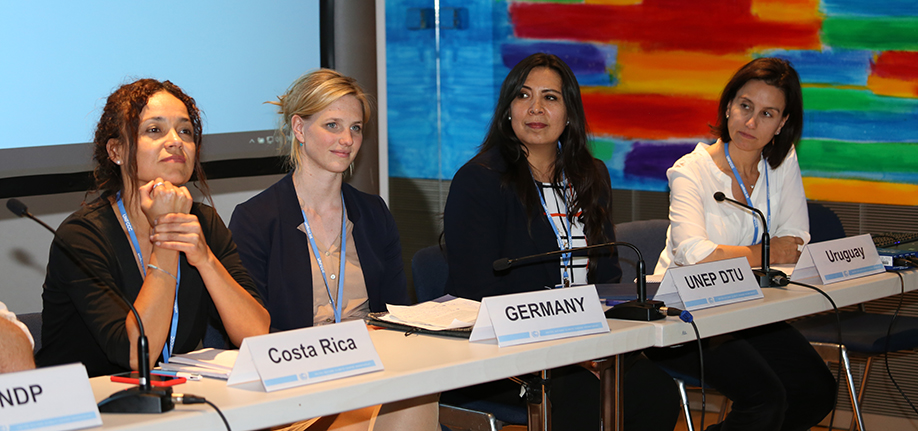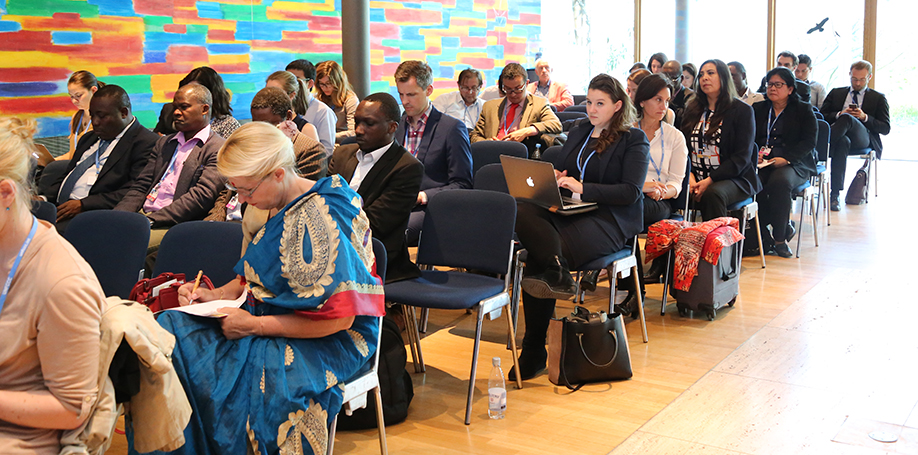Summary
The following side events were covered by ENBOTS on Tuesday, 16 May 2017:
- Open Multi-Stakeholder Dialogue on the Operationalization of the Local Communities and Indigenous Peoples Platform
- Achieving the Paris Agreement through Climate Action in the Land Sector?
- Strengthening Leadership on Low-Carbon Transport to Deliver Long-Term Climate Goals
- Capacity-building Initiative for Transparency: Initial Results and Future Expectations
IISD Reporting Services, through its Earth Negotiations Bulletin on the Side (ENBOTS) Meeting Coverage, is providing daily web coverage of selected side events at the Bonn Climate Change Conference, May 2017.
Photos by IISD/ENB | Angeles Estrada Vigil
For photo reprint permissions, please follow instructions at our Attribution Regulations for Meeting Photo Usage Page
Open Multi-Stakeholder Dialogue on the Operationalization of the Local Communities and Indigenous Peoples PlatformPresented by the Secretariat of the UN Framework Convention on Climate Change (UNFCCC)
This open multi-stakeholder dialogue convened as part of the process to develop the local communities and indigenous peoples platform (LCIP platform), established by Decision 1/CP.21 (Adoption of the Paris Agreement). Carlos Fuller, Chair of the Subsidiary Body for Scientific and Technological Advice (SBSTA), and Grace Balawag, International Indigenous Peoples Forum on Climate Change (IIPFCC), co-chaired the discussion.
During the opening session, Fuller said the establishment of the LCIP platform during COP 21 confirmed that parties recognize the need to strengthen knowledge, technologies, practices and efforts of LCIPs to address and respond to climate change. He applauded the opportunity provided during the dialogue to exchange experiences and share best practices on mitigation and adaptation in a holistic and integrated manner, and emphasized that the dialogue will contribute to articulating clear functions and the structure of the new platform. Balawag welcomed the opportunity for knowledge and experience exchange between all stakeholders, and urged a rich conversation that will provide the basis for a “robust new structure” in order to benefit all LCIPs across the globe.
In a keynote address, Patricia Espinosa, Executive Secretary, UNFCCC, said LCIPs are the stakeholders who best understand the impacts of climate change, as they are “fighting on the frontlines.” Noting that neither the Paris Agreement nor the LCIP platform can succeed without LCIP stakeholders submitting their views, she urged representatives to ensure their “voices are heard” during the dialogue.
During the second session, the panel discussion was moderated by Stephen Leonard, Center for International Forestry Research (CIFOR), during which participants discussed existing experiences with the involvement of LCIPs and with the use of traditional knowledge (TK).
Hindou Oumarou Ibrahim, IIPFCC, provided examples of indigenous peoples’ participation in UN bodies, including in: the UN Permanent Forum on Indigenous Issues; the UN Declaration on the Rights of Indigenous Peoples; and the Working Group on Article 8(j) (TK) of the Convention on Biological Diversity (CBD).
Douglas Nakashima, UN Educational, Scientific and Cultural Organization (UNESCO), said that UNESCO envisions a platform that brings together elements of scientific and indigenous peoples’ knowledge to co-produce “best available knowledge.” He shared examples of UNESCO’s approaches for incorporating indigenous knowledge into its procedures.
Jyoti Mathur-Filipp, UN Development Programme (UNDP), shared UNDP’s 25 years of experience collaborating with indigenous peoples through the Global Environment Facility Small Grants Programme (GEF SGP). She stressed that 15% of the GEF’s small grants support indigenous peoples.
During the third session of the dialogue, the UNFCCC Secretariat presented on submissions received on the purpose, content and structure of the LCIP platform, concentrating on three possible interconnected functions: providing a space for exchange of experiences and sharing of best practices; building capacities of LCIPs to effectively engage in the UNFCCC and other relevant processes, including supporting implementation of the Paris Agreement; and facilitating the integration of diverse knowledge systems, practices and innovations, and the engagement of LCIPs in relevant climate change-related actions, programmes and policies.
LCIP representatives, on behalf of the IIPFCC, inter alia: urged parties to promote and recognize the sustainable practices of indigenous peoples, and encouraged the establishment of “creative links” within the UNFCCC; called for ensuring LCIPs’ full and effective participation; called attention to the need for adequate funding to support LCIPs; emphasized the importance of capacity building to enable indigenous peoples to make a contribution at the international level; stressed that indigenous youth and women require “special measures and targeted attention” to ensure effective transmission of intergenerational knowledge; and called for knowledge exchange in a context-based manner.
Many countries and other entities provided inputs as well. The CBD said that the success of the Working Group on Article 8(j) lies in the nomination of an indigenous co-chair. The Office of the UN High Commissioner for Human Rights said the platform should strengthen the connection of LCIPs with the UNFCCC for a meaningful and informed partnership. UNESCO called for knowledge exchanges between LCIPs and scientists that are more holistic and take into account social and cultural components.
The UN Special Rapporteur on the Rights of Indigenous Peoples (UNSRRIP) emphasized the “inextricable link” between respect for the rights of indigenous peoples and their capacities to contribute to climate change adaptation and mitigation, as well as disaster preparedness and management. Emphasizing linkages between the platform and the Sustainable Development Goals, she stressed the need to look at traditional resource management systems to deal with knowledge exchange in a holistic and integrated manner.
The International Union for the Conservation of Nature (IUCN) stressed the need to build LCIPs’ capacities to participate in climate policies and actions at the national and international levels. Women and Gender said the platform could serve to preserve TK.
The EU underscored the importance of building on relevant experiences within the UNFCCC and learning from experiences in other international contexts. New Zealand expressed support for the LCIP platform’s aim to give indigenous peoples an active role in helping shape climate action.
Ecuador looked forward to the platform’s operationalization, highlighting LCIPs’ “special relationship” with Mother Earth. Canada called for: indigenous peoples to be self-represented in the platform; enhancing interconnectedness among TK and other knowledge systems; and acknowledging losses already experienced by indigenous peoples.
Antigua and Barbuda highlighted her country’s legislation mandating LCIPs’ representation in domestic and international processes. Emphasizing the importance of TK systems for global action on mitigation and adaptation, Norway noted that “the best results come when indigenous peoples have been included and are taking the lead.” Costa Rica called for a coordination mechanism to share knowledge and information on climate change adaptation and mitigation efforts.
Australia said information presented during the dialogue should feed into the platform. Bolivia called for: the establishment of a participatory mechanism on indigenous peoples; meaningful intercultural knowledge exchange among indigenous peoples of the world; and horizontal inter-scientific dialogue among indigenous peoples and established scientific systems. Peru said nationally determined approaches to implementation of Nationally Determined Contributions (NDCs) could be shared through the platform.
L-R: Grace Balawag, IIPFCC; Carlos Fuller, SBSTA Chair; Patricia Espinosa, Executive Secretary, UNFCCC; Koko Warner, UNFCCC; Laurence Pollier, UNFCCC; and Kapupu Diwa Mutimanwa, Ligue Nationale des Associations Pygmées du Congo (LINAPYCO)
Patricia Espinosa, Executive Secretary, UNFCCC, said the “age of implementation” has begun after reaching the Paris Agreement.
Grace Balawag, IIPFCC (left), said she hoped this meeting will be remembered for “laying the foundation” of the COP’s new agenda item.
Participants during the open multi-stakeholder dialogue
Participants attending the open multi-stakeholder dialogue.
Panelists Hindou Oumarou Ibrahim, IIPFCC, and Douglas Nakashima, UNESCO
Kapupu Diwa Mutimanwa, LINAPYCO, opened the dialogue with a prayer on behalf of all LCIPs.
Carlos Fuller, SBSTA Chair, emphasized that the dialogue is “a discussion and not a negotiation.”
Hindou Oumarou Ibrahim, IIPFCC, emphasized that indigenous peoples protect more than 80% of the world’s biodiversity.
A representative from Burkina Faso participates in the LCIP platform dialogue.
Stephen Leonard, CIFOR, stressed that the importance of indigenous peoples in climate change adaptation and mitigation “cannot be overstated.”
Estebancio Castro Diaz, IIPFCC, stressed the need to link the LCIP platform to climate financing programmes.
L-R: Stephen Leonard, CIFOR; Douglas Nakashima, UNESCO; and Jyoti Mathur-Filipp, UNDP
Victoria Tauli Corpuz, UNSRRIP, underscored that “more work needs to be done” to consider indigenous knowledge in NDCs.
Geert Fremout, EU, welcomed the LPIC platform as a “timely operationalization.”
Thanking Canada for taking climate action, Francois Paulette, IIPFCC, said that "what is happening to our world is a crisis, and time is not on our side."
Ruth Spencer, National Coordinator, GEF SGP, Antigua and Barbuda
Anne Barre, Women in Europe for a Common Future
Pamela Rocha, Ecuador
Contact:
- Rojina Manandhar | rmanandhar@unfccc.int
- Koko Warner | kwarner@unfccc.int
More Information:
Achieving the Paris Agreement through Climate Action in the Land Sector? Presented by the Food and Agriculture Organization of the UN (FAO), the International Fund for Agricultural Development and the World Food Programme
This side event was the third of three events of the ‘Rome Series’ on ‘the Paris Agreement and the Agricultural Sectors: Feeding the World in a Changing Climate.’ This session focused on the role of agriculture and food security in Nationally Determined Contributions (NDCs) in terms of both mitigation and adaptation. It was moderated by Martin Frick, FAO.
Highlighting that “a big chunk” of NDCs features agriculture, Lucy Ng'ang'a, Kenya, noted the potential of climate-smart agriculture in enhancing productivity, reducing emissions, improving resilience and providing additional co-benefits. She emphasized the need for technology, capacity building and resources to implement such approaches.
Rita Mishaan, Guatemala, underscored that developing countries face challenges in the design, implementation and review of NDCs. She said her country is working on its low-emission development strategy, which will support the design of methodologies to ensure the necessary indicators are reflected in reporting.
Walter Oyhantçabal, Uruguay, highlighted that mitigation in agriculture is distinct from other sectors given strong links to food security. Reporting back on a thematic working group meeting held in Rome two weeks previously as part of the NDC Partnership’s work on agriculture, he noted agreement to develop terms of reference for the work of the group in a country-led, participatory manner.
Romeo Bertolini, NDC Partnership, highlighted that the Partnership was developed following adoption of the Paris Agreement by developed and developing countries and multilateral institutions in recognition of the need to integrate climate change into development, and fiscal and budgetary processes. He noted the Partnership’s efforts to “connect the dots” between countries to ensure continuous exchange on NDC implementation, including with regard to agriculture.
In the ensuing discussion, participants raised, inter alia: the need for developed countries to take the lead in mitigation while developing countries focus on adaptation; humankind’s “dangerous dependence” on a “very narrow genetic base”; concerns that interventions in the land-use sector will lead to increased marginalization of indigenous peoples and local communities; prospects for protecting forests while improving productivity of agricultural systems; and the need to consider agriculture in the 2018 facilitative dialogue.
Martin Frick, FAO, highlighted that the Sendai Framework for Disaster Risk Reduction, the Sustainable Development Goals and the Paris Agreement “all come together in the land sector.”
Rita Mishaan, Guatemala, said that UN agencies, in addition to UNFCCC parties, need to work together on climate action.
Walter Oyhantçabal, Uruguay, noted the challenge of finding an indicator that reflects progress in adaptation.
Romeo Bertolini, NDC Partnership, stressed the need to ensure that “the momentum of Paris” is maintained and climate change work is not detached from other national activities.
L-R: Walter Oyhantçabal, Uruguay; Lucy Ng'ang'a, Kenya; Martin Frick, FAO; Rita Mishaan, Guatemala; and Romeo Bertolini, NDC Partnership
Contact:
- Julia Wolf | julia.wolf@fao.org
More Information:
-
http://www.fao.org/climate-change/en/
http://www1.wfp.org/climate-action
https://www.ifad.org/topic/overview/tags/climate_change
Strengthening Leadership on Low-Carbon Transport to Deliver Long-Term Climate GoalsPresented by the Institute for Transportation and Development Policy (ITDP) and the Centre for European Economic Research (ZEW)
This side event, moderated by Ramón Cruz, ITDP, discussed ways to ensure better integration of the transport sector in the long-term national decarbonization strategies of Nationally Determined Contributions (NDCs).
Cruz presented an ITDP report titled ‘Three Revolutions in Urban Transportation: How to achieve the full potential of vehicle electrification, automation and shared mobility in urban transportation systems around the world by 2050.’ He called for supportive policies to maximize the benefits of the three “revolutions” described in the report.
Cornie Huizenga, Secretary General, Partnership on Sustainable Low Carbon Transport (SLoCaT), outlined an actionable vision of transport decarbonization towards implementation of the Paris Agreement. Stressing the aim of reaching net zero emissions in the sector, he emphasized the need to strengthen leadership on low-carbon transport. Among the milestones required to take the transport sector to 1.5°C, Huizenga identified urban transformation, low-carbon energy supply strategy, model efficiency improvement and shortened supply chains.
Gregor Pawlowski, BlaBlaCar Germany, said his company is the world’s largest carpooling platform with over 40 million members worldwide. He pointed out that, with around 76% of travel in Europe done by car, the average occupancy rate per city-to-city ride is only 1.7. Noting that sharing a ride “always makes sense,” he indicated that the average occupancy rate among BlaBlaCar users is 2.8.
Jean-François Gagné, International Energy Agency (IEA), highlighted “avoid, shift, improve” strategies for reducing emissions from transport. He observed that emissions from transport in the Organisation for Economic Co-operation and Development (OECD) countries have peaked but could be rapidly reduced and that, with the right policies, transport emissions in non-OECD countries could be brought back to current levels by 2050. Gagné highlighted the IEA’s Electric Vehicle Initiative, noting that setting ambitious targets can drive accelerated progress towards emission reductions.
Among challenges faced by her country’s transport sector, Pacifica Achieng Ogola, Ministry of Environment and Natural Resources, Kenya, highlighted transport access, urban congestion, the growing urban population and the quality of roads. She informed participants that Kenya’s emission reduction target reflected in its NDC includes the transport sector.
Kathrine von Graevenitz, Centre for European Economic Research (ZEW), highlighted that pricing carbon is instrumental to fostering low-carbon transport. Among available abatement options, she listed reduction of carbon content in fuel, fuel economy in cars and other vehicles, and changing driving behaviors and transport demand, all of which can be addressed though pricing carbon. Highlighting the role of voluntary approaches, she pointed out that “incentives matter,” and their effects can be long lasting.
Marcel Beukeboom, Climate Envoy, the Netherlands, cautioned against looking at sectors in isolation and highlighted the importance of bringing stakeholders to the table. He noted: the Netherlands’ goal of all new cars being electric by 2035; that all Dutch trains have run on wind energy since 2016; and the significance of replicating his country’s experience with bicycles.
In the ensuing discussion, participants addressed, inter alia: second-hand electric vehicle use in Africa; fuel economy standards for second-hand cars; the role of policies in improving cost effectiveness of electric vehicles; obstacles to electrification of the car fleet; and the role of multi-stakeholder cooperation and public-private partnerships in transport sector decarbonization.
L-R: Ramón Cruz, ITDP; Gregor Pawlowski, BlaBlaCar Germany; Marcel Beukeboom, Climate Envoy, the Netherlands; Kathrine von Graevenitz, ZEW; Cornie Huizenga, Secretary General, SLoCaT; and Jean-François Gagné, IEA
Ramón Cruz, ITDP, noted that, compared to business as usual, the scenario involving automation, electrification and sharing produces “impressive global results.”
L-R: Ramón Cruz, ITDP; Gregor Pawlowski, BlaBlaCar Germany; Marcel Beukeboom, Climate Envoy, the Netherlands; Kathrine von Graevenitz, ZEW; Cornie Huizenga, Secretary General, SLoCaT; and Jean-François Gagné, IEA
Cornie Huizenga, Secretary General, SLoCaT, said the “time is right for a Transport Decarbonization Alliance.”
Gregor Pawlowski, BlaBlaCar Germany, said that 12 million people travel using BlaBlaCar each quarter.
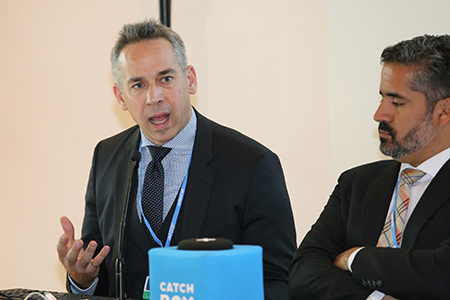 Jean-François Gagné, IEA, indicated that electric vehicles could play a much larger role, and setting ambitious targets can drive accelerated progress.
Jean-François Gagné, IEA, indicated that electric vehicles could play a much larger role, and setting ambitious targets can drive accelerated progress.
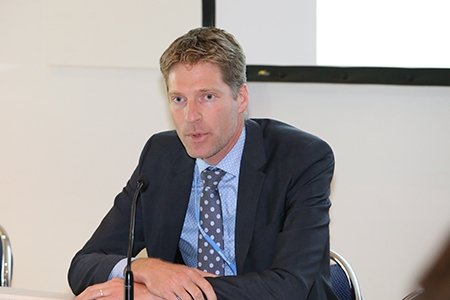 Marcel Beukeboom, Climate Envoy, the Netherlands, highlighted cooperation between the public and private sectors and civil society in the Netherlands.
Marcel Beukeboom, Climate Envoy, the Netherlands, highlighted cooperation between the public and private sectors and civil society in the Netherlands.
Ramón Cruz, ITDP, noted that, compared to business as usual, the scenario involving automation, electrification and sharing produces “impressive global results.”
Pacifica Achieng Ogola, Ministry of Environment and Natural Resources, Kenya, said that her country’s NDC includes climate proofing roads, enhancing transport systems and building roads’ resilience.
Contact:
-
Ramón Cruz (Moderator) | ramon.cruz@itdp.org
Kathrine von Graevenitz | vongraevenitz@zew.de
More Information:
Capacity-building Initiative for Transparency: Initial Results and Future Expectations Presented by the UN Development Programme (UNDP) and UN Environment
This side event focused on analyzing initial results of, and expectations for, the Capacity-building Initiative for Transparency (CBIT) Global Coordination Platform, an initiative funded by the Global Environment Facility (GEF) and jointly implemented by UNDP and UN Environment. Damiano Borgogno, UNDP, moderated the event.
Suzanne Lekoyiet, UN Environment, said that UN Environment has supported countries in meeting their reporting requirements under the UN Framework Convention on Climate Change (UNFCCC). She said that the CBIT will support developing countries by: improving transparency over time; assembling teams of experts to meet enhanced monitoring, reporting and verification (MRV) requirements under the Paris Agreement; providing tools, templates, technical assistance and training; and providing a platform for networking and sharing information and knowledge. She noted that UN Environment has supported the preparation of three CBIT concept notes to date.
Toby Hedger, UNFCCC Secretariat, said Article 13 of the Paris Agreement (transparency) includes three key elements: reporting; technical expert review; and multilateral facilitative consideration. She noted that while modalities, procedures and guidelines for these elements are still being negotiated, many preparations can already occur. She highlighted the need to build capacity for institutional arrangements, tools and methodologies, and data and information.
Dustin Schinn, GEF, said that, while the Paris Agreement “marked a turning point in the common fight against climate change,” action on the ground lags behind. Outlining CBIT access possibilities, he underscored that, in addition to providing national-level support, the CBIT provides regional and global support. He highlighted the CBIT’s Global Coordination Platform that supports knowledge exchange, peer-to-peer learning and exchange of practitioners. Shinn noted that US$38 million is currently available in the CBIT trust fund for new projects, with additional payments and pledges expected soon.
Noting that only 36 Biennial Update Reports (BURs) were submitted during the first BUR cycle, and only five in the second, Damiano Borgogno, UNDP, highlighted the need to draw lessons from experiences with BURs and National Communications for integration into the Paris Agreement’s transparency framework.
Mariana Kasprzyk, Uruguay, highlighted her country’s CBIT project, approved in March 2017, which consists of two components: strengthening national institutions for transparency; and providing tools, training and technical assistance for meeting the obligations under Article 13 of the Paris Agreement.
Andrea Meza, Costa Rica, reflected on Costa Rica’s challenges in implementing climate policy and the “added value” of the CBIT. Highlighting her country’s national transparency framework, she reported that the CBIT has helped generate a “more integrated and sophisticated system” by supporting data-driven decision making and facilitating efficient institutional arrangements.
Miriam Hinostroza, UNEP DTU Partnership, introduced the CBIT Global Coordination Platform, noting “very high ambition” to create a space where countries can share information, experiences and lessons learned on transparency and MRV. Among elements the Platform could include, she highlighted: spaces to share initiatives and for donors to upload information on support being provided; a virtual library and helpdesk; and a virtual meeting place.
Kirsten Orschulok, Germany, stressed that countries need “data, facts and figures” to decide which policies and adaptation and mitigation plans are appropriate, and to adapt these policies over time. Suggesting possibilities for “South-South-North” exchange, she stressed that her country can learn how to improve its reporting and transparency systems from developing country partners.
During the ensuing discussion, participants raised, inter alia: the mission of the CBIT regarding engagement of non-governmental actors in implementation of the transparency framework; challenges of countries that applied to the CBIT; the GEF Gender Equality Action Plan and mandated stakeholder engagement; and the role of South-South cooperation in knowledge-sharing platforms.
L-R: Damiano Borgogno, UNDP; Dustin Schinn, GEF; and Suzanne Lekoyiet, UN Environment
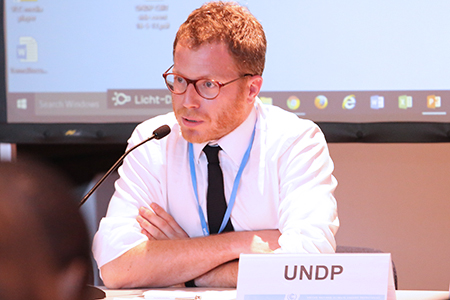 Damiano Borgogno, UNDP, emphasized MRV and enhanced transparency should not only be put in place to meet international requirements, but “first and foremost for national benefits.”
Damiano Borgogno, UNDP, emphasized MRV and enhanced transparency should not only be put in place to meet international requirements, but “first and foremost for national benefits.”
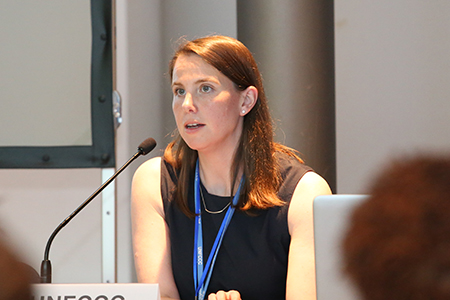 Toby Hedger, UNFCCC Secretariat, noted that developing countries already face challenges to timely reporting, and said support needs to continue to address these gaps and challenges.
Toby Hedger, UNFCCC Secretariat, noted that developing countries already face challenges to timely reporting, and said support needs to continue to address these gaps and challenges.
Suzanne Lekoyiet, UN Environment, stressed that, while much has been achieved under the CBIT, “urgent action” is still needed.
Highlighting Costa Rica's platform for consultation, Andrea Meza, Costa Rica, noted her country's role in encouraging non-state actors to participate in climate policymaking.
Andrea Meza, Costa Rica; Kirsten Orschulok, Germany; Miriam Hinostroza, UNEP DTU Partnership; and Mariana Kasprzyk, Uruguay
Contact:
- Damiano Borgogno | damiano.borgogno@undp.org
